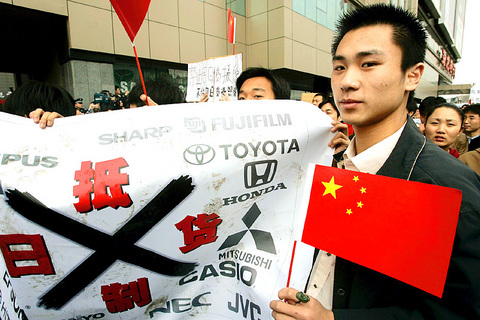China yesterday warned ties with Japan were at a 30-year low and reiterated it would not apologize for widespread protests, but Japan said it saw no need to change its policy despite a "very uncomfortable situation."
As Japanese Foreign Minister Nobutaka Machimura held a second day of talks in Beijing, Chinese Vice Foreign Minister Wu Dawei (
"There are serious difficulties between China and Japan at the moment. It is the most difficult time since the establishment of diplomatic ties in 1972," he told reporters, blaming Japan's refusal to face its past record of aggression.

PHOTO: EPA
In contrast, Japanese foreign ministry spokesman Hatsuhisa Takashima attempted to put a more positive spin on relations as he focused on economics at a press conference in the Chinese capital.
He added, however, that Chinese protesters who damaged Japanese property had created a "very uncomfortable situation."
Ties between East Asia's two most powerful nations have rapidly approached a nadir after Japan approved a nationalist textbook that glossed over wartime atrocities.
They have been further ruffled by Japan's bid for a permanent seat on the UN Security Council.
Meanwhile, three out of every four Japanese voters believe Prime Minister Junichiro Koizumi has not done enough to improve long-strained relations with China and South Korea, according to a newspaper poll published yesterday.
Seventy-six percent of respondents to a poll of about 1,000 voters the Mainichi Shimbun on Saturday and Sunday said Koizumi had not done enough to mend ties with Japan's neighbors, both of which were occupied by Japan before and during World War II.
In Tokyo, shots were fired yesterday at a Chinese language school, hitting a door but causing no injuries, in the latest apparent backlash against violent anti-Japanese demonstrations in China, police and media said.
A razor blade with an anonymous note complaining about the protests also was delivered by mail last week to the Chinese consulate in Fukuoka the Kyodo News agency reported.
Police said they found several bullet holes in the glass door at the entrance of the Japan-China Friendship Center. Investigators also found several bullets at the site. Kyodo said the shooting was believed to be linked to the protests. Nobody claimed responsibility.
Japan's benchmark Nikkei stock index closed down 3.80 percent yesterday amid the escalating tensions, ending at 10,938.44 points -- its lowest point since Dec. 16.

AIR SUPPORT: The Ministry of National Defense thanked the US for the delivery, adding that it was an indicator of the White House’s commitment to the Taiwan Relations Act Deputy Minister of National Defense Po Horng-huei (柏鴻輝) and Representative to the US Alexander Yui on Friday attended a delivery ceremony for the first of Taiwan’s long-awaited 66 F-16C/D Block 70 jets at a Lockheed Martin Corp factory in Greenville, South Carolina. “We are so proud to be the global home of the F-16 and to support Taiwan’s air defense capabilities,” US Representative William Timmons wrote on X, alongside a photograph of Taiwanese and US officials at the event. The F-16C/D Block 70 jets Taiwan ordered have the same capabilities as aircraft that had been upgraded to F-16Vs. The batch of Lockheed Martin

US President Donald Trump yesterday announced sweeping "reciprocal tariffs" on US trading partners, including a 32 percent tax on goods from Taiwan that is set to take effect on Wednesday. At a Rose Garden event, Trump declared a 10 percent baseline tax on imports from all countries, with the White House saying it would take effect on Saturday. Countries with larger trade surpluses with the US would face higher duties beginning on Wednesday, including Taiwan (32 percent), China (34 percent), Japan (24 percent), South Korea (25 percent), Vietnam (46 percent) and Thailand (36 percent). Canada and Mexico, the two largest US trading

GRIDLOCK: The National Fire Agency’s Special Search and Rescue team is on standby to travel to the countries to help out with the rescue effort A powerful earthquake rocked Myanmar and neighboring Thailand yesterday, killing at least three people in Bangkok and burying dozens when a high-rise building under construction collapsed. Footage shared on social media from Myanmar’s second-largest city showed widespread destruction, raising fears that many were trapped under the rubble or killed. The magnitude 7.7 earthquake, with an epicenter near Mandalay in Myanmar, struck at midday and was followed by a strong magnitude 6.4 aftershock. The extent of death, injury and destruction — especially in Myanmar, which is embroiled in a civil war and where information is tightly controlled at the best of times —

China's military today said it began joint army, navy and rocket force exercises around Taiwan to "serve as a stern warning and powerful deterrent against Taiwanese independence," calling President William Lai (賴清德) a "parasite." The exercises come after Lai called Beijing a "foreign hostile force" last month. More than 10 Chinese military ships approached close to Taiwan's 24 nautical mile (44.4km) contiguous zone this morning and Taiwan sent its own warships to respond, two senior Taiwanese officials said. Taiwan has not yet detected any live fire by the Chinese military so far, one of the officials said. The drills took place after US Secretary